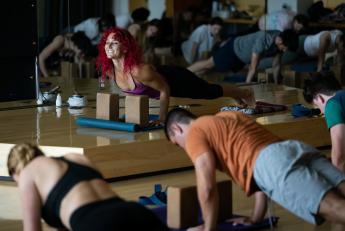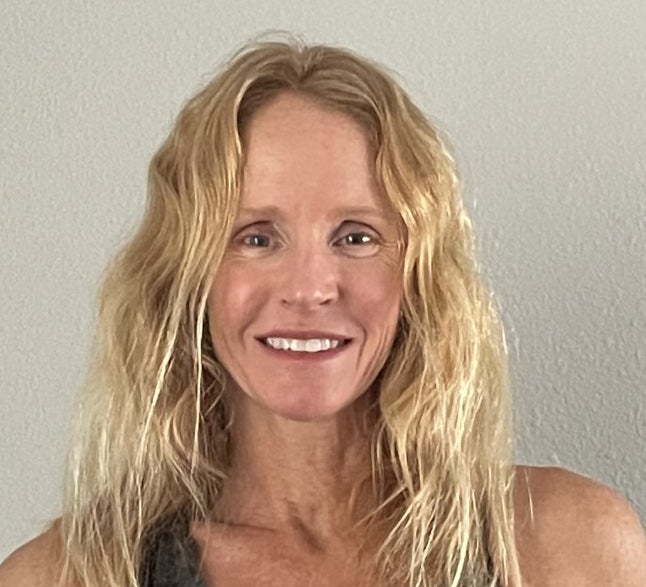Ask an Expert: How Do I Stick to an Exercise Plan in the New Year?

With a new year comes new beginnings — and resolutions. One of the most popular is exercising more, with gym memberships reliably skyrocketing each January (minus the pandemic years). But what are the best ways to get started on a new exercise routine? And how can you stick to it once the initial shine has worn off?

Cal Poly News sat down with exercise scientist and kinesiology professor Nicole Hagobian, who specializes in the social psychology of exercise and sport, to find out.
What are the benefits of building an exercise routine?
There are so many benefits of sticking to an exercise routine. Social benefits include feeling more connected to the community and to people with similar interests. There are mental health benefits in terms of decreased stress, decreased anxiety and lower rates of depression. You also gain feelings of competency, that ‘I can’ attitude of ‘I can do this, I can go through a process and stick to something and see it through.’
That level of confidence can transfer to other areas of your life. For example, having a set exercise routine and schedule can often help people feel more organized, and they carry that far beyond the gym.
What are the best ways to get started in an exercise routine for the new year?
A good place to start is by asking yourself what you’re interested in. What have you done and what have you not done? Take an inventory of what excites you. If it’s exciting to you, you’re more likely to stick with it.
Another thing to do is take an inventory of your perceived barriers to adhering to your program. Ask yourself what you think would get in your way or what has gotten in your way in the past. From there, you can find a solution to overcome that barrier.
Lastly, try to figure out what type of exercise environment is most motivating to you. For example, you might feel more comfortable exercising in solitude, maybe by going on solo hikes and connecting with nature. You could also be a person who really thrives off having a group to meet with. That can inform your decisions about what you do.
I think we know ourselves better than we’d like to admit, so being very honest with yourself about why you’re doing what you’re doing, what your motives are and how you can achieve those goals is going to help you stick with your plan.
Are there any routines or best practices you recommend?
Schedule your exercise into your day, like you would a meeting, but be flexible. If you’re too rigid and something gets in the way of your scheduled exercise time, you can get into catastrophic thinking and you think, ‘Oh, I skipped my exercise in the morning so now I can’t do it.’ That’s also not very facilitative toward adhering to a routine.
I have my exercise routine, but I also have three kids, and life can get in the way. So even if something happens and I can’t do my scheduled exercise, I have to remind myself there are other options, even if that option is for a shorter time period. My philosophy is something is better than nothing, so if I get a shorter routine in that day, that’s OK. Have a plan but be flexible with that plan.
What are some common things that throw people off their exercise goals?
Any type of life change can throw people off their exercise goals. Some examples of that are starting college, a marriage, a child, new job or an illness. Usually, people are stressed during those points of their life, so they put exercise on the back burner, but that’s actually when you do want to exercise. Even when you’re very busy, if you can wrap your head around the fact that building in and prioritizing exercise is going to help with that stress level, it’s going to help with that entire process of what is going on in your life.
How do you stay motivated to keep exercising after the initial resolution wears off?
I think there’s a variety of ways to stay motivated. One of the things that works for some people is giving yourself some type of reward at a certain point in time. I often suggest that reward is something related to exercise: something that is going to enhance and further your exercise experience and make you more excited about it. Maybe you decided to go to a climbing gym and after going for two months, you buy yourself a pair of your own climbing shoes because you’ve been using the climbing shoes at the gym.
Personally, as a runner, I love new shoes. When I have a new pair, I'm excited to put those on, and little things like that can help with motivation.
Visual reminders are another way to stay motivated. If you work out in the morning, put out your exercise clothing, gear or whatever you need the night before so you have to walk by it and see it. If you exercise after work, put it in your car so you don’t have to stop back home and pick it up. Having little reminders like sticky notes with positive affirmations for what you’re trying to accomplish are also helpful. Just continue to coach yourself through the process.
As you go along, if you are considering skipping a workout, remind yourself how you feel afterwards. Most people have really positive feelings and that can also serve as a source of motivation if you think about it that way.
Do you have any other advice for people starting out or trying to stick with their routine?
Give yourself grace and realize that starting a new habit is difficult. Be proud of yourself for going through the steps and taking on that challenge. Use positive affirmations.
You want to always state goals in terms of what you want to do, not what you don’t want to do. The way you frame things and the way you talk to yourself makes a huge difference in how you feel about what you’re doing.
Chunking things can often help people as well. For myself, when I'm running intervals, I'm only thinking about the first one when I’m on the first one. I’m never thinking ‘I’m on number one but I have to do 10 of these.’ Staying in the moment really helps.
And last but not least, something's better than nothing. Get out the door and start.




